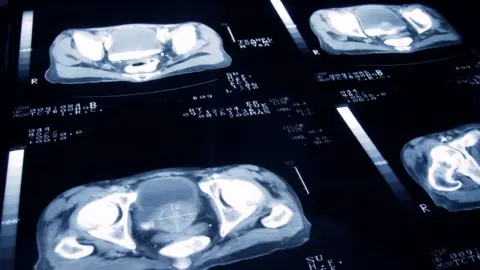Cancer survival improvements slow down in Wales
 jamesbenet/Getty Images
jamesbenet/Getty ImagesThe improvement in cancer survival in Wales is slowing down, according to new analysis by cancer experts.
And the gap in survival chances for breast and lung cancers is widening between richer and poorer parts of the country.
The Welsh Cancer Intelligence and Surveillance Unit (WCISU) said a range of wider social and economic factors were likely to affect life-expectancy.
It said reasons for it were complex and needed more detailed investigation.
Dr Dyfed Wyn Huws, director of WCISU - part of Public Health Wales - said cancer survival was continuing to increase but the improvement trend had slowed slightly.
"The most recent gains we've seen in cancer survival have not been sustained at the same rate as we have seen in the past," he said.
"In Wales, and the UK more widely our report shows that five-year cancer survival in the most disadvantaged communities in Wales is only three-quarters of that in least disadvantaged, with little recent improvement in inequality."
- The gap between survival in the most disadvantaged areas and least disadvantaged is 11.5 percentage points for one-year survival, and 16.8 percentage points for five-year survival.
- The gap in five-year survival is widening for breast and lung cancers.
- The inequality gap has reduced slightly for bowel cancer
- There are no significant differences between Wales and England for most cancer types, apart from one-year lung cancer survival, and leukaemia, and cancers of the prostate and stomach for five-year survival.
- But Wales is still relatively poor compared with other nations - ranked 26th out of 32 countries on survival of lung, colon and pancreatic cancer, 29th on cancer of the ovary and last but one (31 out of 32) on stomach cancer.
Richard Pugh, head of services at Macmillan Cancer Support in Wales, said it was "unacceptable" there was a gap in five-year survival rates for people living in the poorest communities, compared with those in our wealthiest areas.
"Welsh Government must go further to better understand why this gap exists and what can be done to close it," he said.
Cancer Research UK in Wales said the gap was "worrying".
NHS Wales has recently introduced a number of initiatives to try to improve cancer survival including an initiative to improve screening uptake and awareness of symptoms as well as efforts to improve early diagnosis - for example the introduction of a new single waiting time target for cancer treatment.
The analysis suggests, as these initiatives bed-in, we may expect further improvements in survival rates.
Dr Huws said the slow down might be partly due to a wider slow-down in gains in life-expectancy in Wales over the decade - but it was not unique in the western world.
"This phenomenon appeared across many causes of death, including from some cancers, and appears to particularly affect the most disadvantaged communities in Wales," he said.
